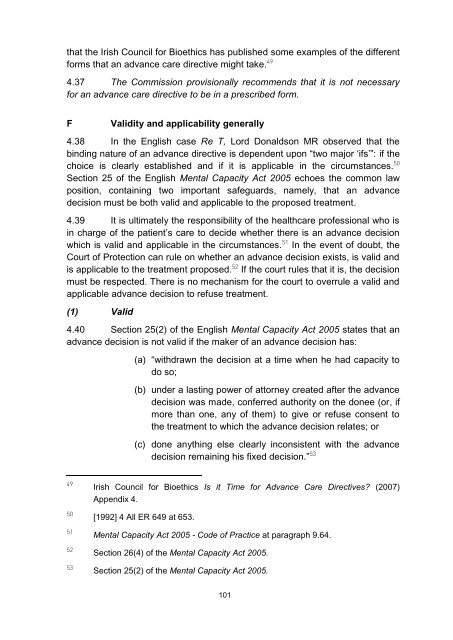Consultation Paper on Bioethics - Law Reform Commission
Consultation Paper on Bioethics - Law Reform Commission
Consultation Paper on Bioethics - Law Reform Commission
You also want an ePaper? Increase the reach of your titles
YUMPU automatically turns print PDFs into web optimized ePapers that Google loves.
that the Irish Council for <strong>Bioethics</strong> has published some examples of the different<br />
forms that an advance care directive might take. 49<br />
4.37 The Commissi<strong>on</strong> provisi<strong>on</strong>ally recommends that it is not necessary<br />
for an advance care directive to be in a prescribed form.<br />
F Validity and applicability generally<br />
4.38 In the English case Re T, Lord D<strong>on</strong>alds<strong>on</strong> MR observed that the<br />
binding nature of an advance directive is dependent up<strong>on</strong> “two major „ifs‟”: if the<br />
choice is clearly established and if it is applicable in the circumstances. 50<br />
Secti<strong>on</strong> 25 of the English Mental Capacity Act 2005 echoes the comm<strong>on</strong> law<br />
positi<strong>on</strong>, c<strong>on</strong>taining two important safeguards, namely, that an advance<br />
decisi<strong>on</strong> must be both valid and applicable to the proposed treatment.<br />
4.39 It is ultimately the resp<strong>on</strong>sibility of the healthcare professi<strong>on</strong>al who is<br />
in charge of the patient‟s care to decide whether there is an advance decisi<strong>on</strong><br />
which is valid and applicable in the circumstances. 51 In the event of doubt, the<br />
Court of Protecti<strong>on</strong> can rule <strong>on</strong> whether an advance decisi<strong>on</strong> exists, is valid and<br />
is applicable to the treatment proposed. 52 If the court rules that it is, the decisi<strong>on</strong><br />
must be respected. There is no mechanism for the court to overrule a valid and<br />
applicable advance decisi<strong>on</strong> to refuse treatment.<br />
(1) Valid<br />
4.40 Secti<strong>on</strong> 25(2) of the English Mental Capacity Act 2005 states that an<br />
advance decisi<strong>on</strong> is not valid if the maker of an advance decisi<strong>on</strong> has:<br />
(a) “withdrawn the decisi<strong>on</strong> at a time when he had capacity to<br />
do so;<br />
(b) under a lasting power of attorney created after the advance<br />
decisi<strong>on</strong> was made, c<strong>on</strong>ferred authority <strong>on</strong> the d<strong>on</strong>ee (or, if<br />
more than <strong>on</strong>e, any of them) to give or refuse c<strong>on</strong>sent to<br />
the treatment to which the advance decisi<strong>on</strong> relates; or<br />
(c) d<strong>on</strong>e anything else clearly inc<strong>on</strong>sistent with the advance<br />
decisi<strong>on</strong> remaining his fixed decisi<strong>on</strong>.” 53<br />
49 Irish Council for <strong>Bioethics</strong> Is it Time for Advance Care Directives? (2007)<br />
Appendix 4.<br />
50 [1992] 4 All ER 649 at 653.<br />
51 Mental Capacity Act 2005 - Code of Practice at paragraph 9.64.<br />
52 Secti<strong>on</strong> 26(4) of the Mental Capacity Act 2005.<br />
53 Secti<strong>on</strong> 25(2) of the Mental Capacity Act 2005.<br />
101

















